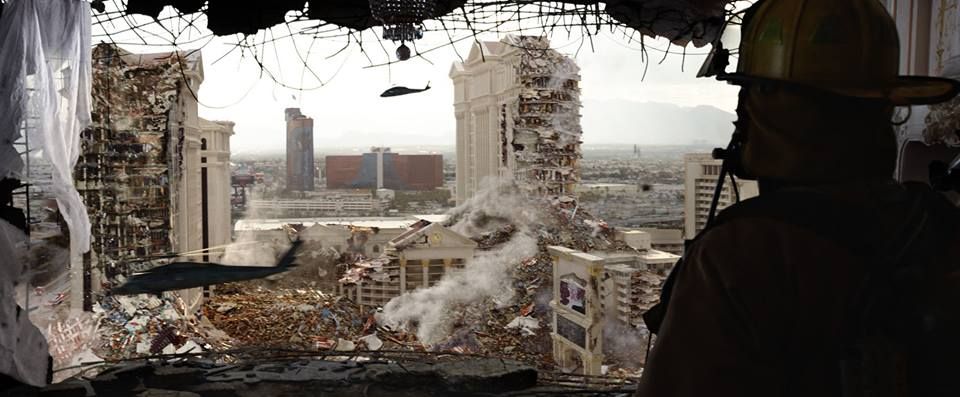Audiences have experienced Godzilla in almost too many incarnations to lock one down as definitive: The 1954 original film offered a harrowing metaphor for nuclear destruction, decades of sequels created a landscape overstuffed with rubber-suited men squaring off in camp showdowns, and a 1998 “remake” evidenced filmmaker hubris and wrongheaded storytelling. All of which makes Gareth Edwards’ upcoming film even more of a curiosity, as he and his collaborators are in the unenviable position of deciding what will be the next iteration of this iconic monster.
Before appearing on a panel at WonderCon Anaheim, Edwards and screenwriter Max Borenstein, spoke briefly with Spinoff Online about the challenges and opportunities of recreating Godzilla for a new era. In addition to describing the pitfalls of updating the metaphors the creature embodies, they revealed a few details about what’s in their film, and explained how they hope the result will thrill audiences and make them think.
Spinoff Online: I guess first of all, how would you characterize what you were doing with this material – is it a reboot, a remake, reimagining?
Max Borenstein: That’s a good question. I think trying to respect material that I loved and also we were trying to find a way in that would be accessible for people who were not necessarily fans to kind of be converted and fall in love with it also. So I guess it’s a kind of middle of the two – adaptation and in a sense reimagining. I mean, one thing we talked about was the idea that, imagine if sometime in the ’50s, like, Godzilla had actually emerged off the shores of Japan. People had glimpsed it and the movie producer made a movie about it and started making a franchise about it, that that’s sort of what the Godzilla movies are, and we wanted to kind of go back – well, what was that creature, and try to get it from, you know, sort of reimagine in that sense.
The original movie is, of course, so incredibly serious and powerful. But then the evolution or devolution, depending on how you look at it, has led people to know this as a sort of a camp character to a certain extent.
How fun is this movie, and how serious did you want it to be?
Gareth Edwards: I find serious sci-fi fantasy a lot of fun. So it’s – I take it seriously but I hope that’s fun because I have a lot of fun really believing this crazy stuff is real. Like, I find it exciting and so there are light moments in the film, you know. […] It’s not that people in the movie are cracking jokes. It’s sometimes the filmmakers are having fun with the terrible events that are happening. Like, so you kind of chuckle to yourself because of the insanity of something or the way that we show it, and it’s not. But the people in it aren’t having much fun at all because if this really happened it would be like a world changing, you know, very horrific situation to go through.
Borenstein: Well, all of my favorite monster movies, and I know Gareth’s too, and sci-fi movies and fantasy movies always have a real root planted in some fear in that we have as humans living in the real world and that’s what makes it resonant. And that was certainly the case with Gojira. It’s an amazing film in its context, and even still. It might as well be a film actually about Hiroshima and Nagasaki, and when you see some of the footage in it, it feels like it could be like news footage, people with bandages, which it isn’t, but they intentionally went for that. And I think that’s why it lasts because it’s so authentic. And so the goal for us – the bar we set was to try to find something that was as – that was trying to be as resonant and as relevant as we could using this monster as a metaphor but to the times today. And that’s sort of, you know, for us that became about nature and our relationship with nature. And Godzilla is a metaphor for nature and how we have, you know, in some sense tampered with it and how it – our chickens come home to roost.
How careful do you have to be then to even potentially sort of evoke more recent sort of disasters, be it Katrina or 9/11? Does the success of the original in doing that embolden you to combine the serious and the entertaining without worrying about it sort of becoming a dirge?
Edwards: Yeah, I think the [original] gave us a license to embrace it a little bit more than we probably would have. Yeah, it’s kind of like, you know, all great science fiction fantasy’s a metaphor, really. I mean, there’s the idea that a giant monster’s going to come and smash the city is something we never really have to worry about. But the repercussions of what it does, you know, there’s giant waves and radiation and destroyed buildings – are very much things that we’ve experienced in the last decade or so. It’s like there’s you know see it into our memories is, you know, is recently a lot of terrible natural disasters and given the terrorism that’s happened. And so it’s nearly impossible to make a film like this when you’re trying to, you know, be as realistic as you can with the way it might look and not be haunted by those images and have them infect your film. And so but I think thankfully, like, it’s – because the original one is so much borne out of like trying to find something in the real world that needs to be, you know, I think it’s part of human nature to try and explain why something terrible happened. Like, try and give a reason and ultimately sometimes there’s no reason whatsoever. Like, it’s just the way things are – they’re just nature and we can’t control that. And so the way that we give hurricanes names, you know, we personify them is a bit like what a Godzilla movie is. We’re trying to, like – you try and blame these experiences on an actual person and this is why it’s happened. And so there’s something kind of – I don’t know if it’s reassuring, but something that feels right about reliving those kinds of experiences but going, “See I knew it was someone’s fault.” You know, even though it isn’t really. It’s just nature doing its thing.
Borenstein: You don’t want to seem exploitative, but I think at the same time, I don’t think it is exploitative to try to have a sci-fi movie that’s resonant tonally and fanatically. So certainly that’s a line to walk I guess but and it’s something we talked about. But I wouldn’t say we ever wanted to shy away from making a movie that was serious in tone and, you know, at the same time really fun and exciting. I think it’s that – that’s the great thing about – for me about genre movies in general is that it’s the sweetness to swallow the bitter pills of like thinking about stuff, you know. And when you walk out thinking about things after a movie like this then hopefully that’s the high bar.
Does the dubious success of the ‘98 Godzilla put pressure on you or does it give you more freedom as you’re reinventing or reimagining this character for modern audiences?
Edwards: I mean, it’s equal. I think if you were trying to remake Casablanca, you might – I don’t know if that would be easier or harder. And yeah, I think we try to avoid any real comparisons, because the inspiration for us was the original ‘54 movie. I feel like if all that ever existed was that ‘54 movie and there was never another Godzilla, we probably would have still been trying to make it. Like, it was that film that – the fact that it had weight, like – the fact that it was serious, because I think there’s a lot of temptation for people like me to do interviews like this and say all of those buzzwords, where it’s like, “We’re taking it seriously, it’s going to be gritty and realistic,” and think that we’re special. And the reality is that 60 years ago is very realistic, very gritty, harrowing monster movie called Godzilla and they kind of did it first. But I just think Godzilla’s never going to go away. I think there’s a reason it survived 60 years. It taps into something very primal, this expectation that nature is going to – we’ve had it too good. Nature’s going to come, we’re going to get our justice for messing up the planet and things and the power of nature. And I just think we’re always going to feel that way. There’s a little bit of guilt we have for being the alpha predator. And that one day, maybe we will lose that position as alpha predator, and we will get punished.
Godzilla opens May 16.


